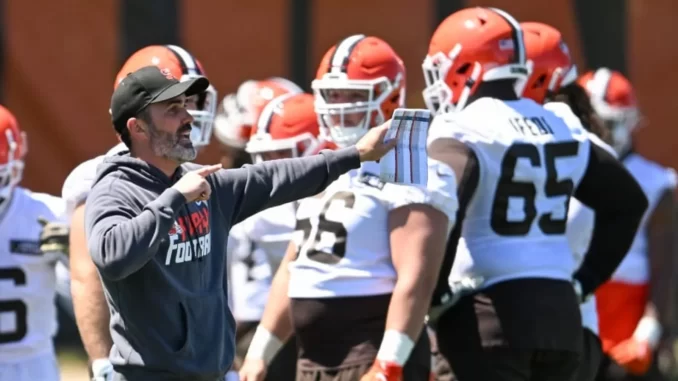
In the ever-evolving landscape of the NFL, the role of a head coach is often defined by their ability to adapt, innovate, and lead. For Cleveland Browns, the head coach of the Cleveland Browns, his role as the team’s primary play-caller has recently become a topic of heated debate among fans and analysts. Despite growing criticism and calls for change, the decision to retain Stefanski as the Browns’ play-caller is not only defensible but also strategically sound. This analysis explores why maintaining Stefanski in this role, even if it is unpopular, aligns with the broader objectives of the Browns’ long-term success.
A play-caller’s role is pivotal, especially in an NFL landscape where strategy and execution are closely intertwined. The play-caller is tasked with designing and executing game plans that exploit opponents’ weaknesses while capitalizing on their own team’s strengths. This role requires a deep understanding of both the game and the players, and Stefanski has demonstrated both in his tenure with the Browns.
Stefanski’s offensive philosophy, which emphasizes a balanced attack and efficient use of the running game, is foundational to the team’s overall strategy. His play-calling is not merely a matter of drawing up plays; it involves making real-time decisions that can significantly impact the outcome of games. This level of responsibility means that any changes in this area must be carefully considered.
One of the strongest arguments for keeping Stefanski as the Browns’ play-caller is the value of continuity. In a league notorious for its high turnover rates and constant restructuring, stability can be a crucial asset. Stefanski has been with the Browns since 2020, and his familiarity with the roster, the team’s systems, and the specific challenges they face offers a level of consistency that is often overlooked.
Continuity allows for the development of a cohesive offensive strategy. It enables Stefanski to refine his game plans, build on previous successes, and learn from past failures. This gradual process of improvement is essential in a league where the margin for error is razor-thin. Sudden changes in the play-calling role could disrupt this progression and lead to further instability.
Stefanski’s role extends beyond just calling plays; it also involves mentoring and developing players. For young quarterbacks and skill position players, having a consistent play-caller can be incredibly beneficial. Stefanski’s experience and approach have been instrumental in the development of players like Baker Mayfield and, more recently, Deshaun Watson.
For instance, Stefanski’s offensive system is designed to be quarterback-friendly, providing clear progressions and read options that help young quarterbacks make quicker and more accurate decisions. This system not only facilitates their growth but also instills confidence in their abilities. Changing the play-caller could disrupt this development, potentially stunting the growth of key players.
It is important to acknowledge the criticisms that Stefanski has faced. Some argue that his play-calling has been too conservative or that he has been unable to adapt to in-game situations effectively. These concerns are not without merit and are part of a broader conversation about the effectiveness of coaching decisions.
However, it is crucial to evaluate these criticisms within the context of the challenges Stefanski has faced. Injuries, roster changes, and other external factors can impact a coach’s ability to execute their game plan. Stefanski has had to navigate these challenges while trying to implement a complex offensive system. It is possible that some of the perceived issues with play-calling are a result of these external factors rather than inherent flaws in Stefanski’s approach.
In the NFL, short-term success is often prioritized over long-term vision. However, building a successful franchise requires a long-term perspective. Stefanski’s play-calling decisions are part of a larger strategy to build a competitive team capable of sustained success.
By keeping Stefanski as the primary play-caller, the Browns are demonstrating a commitment to their long-term vision. This approach allows them to continue refining their offensive strategy, developing players, and building a cohesive team. Changing play-callers frequently can undermine these efforts and hinder the team’s ability to establish a strong identity.
While it is easy to call for a change in the play-calling role, it is important to consider what alternatives might look like. Bringing in a new play-caller could involve significant changes to the offensive system and potentially lead to a period of adjustment. Additionally, there are no guarantees that a new play-caller would necessarily perform better than Stefanski.
Stefanski has demonstrated a commitment to learning and adapting. His willingness to address and correct mistakes is a sign of his dedication to improving his play-calling. Rather than seeking an immediate change, it may be more prudent to allow Stefanski the opportunity to address any issues and continue building on the progress he has made.
Kevin Stefanski’s role as the Browns’ play-caller has been a subject of considerable debate. While the criticisms are valid and warrant discussion, the decision to retain Stefanski in this role is strategically sound. His deep understanding of the team, the value of continuity, the development of young players, and the importance of a long-term vision all support the case for his continued involvement in play-calling.
In an NFL landscape that often favors short-term fixes over long-term stability, keeping Stefanski as the Browns’ play-caller represents a commitment to building a successful and sustainable franchise. The challenges faced by the Browns under Stefanski’s leadership are part of the broader process of growth and development, and maintaining consistency in play-calling is a crucial component of that journey.
Leave a Reply